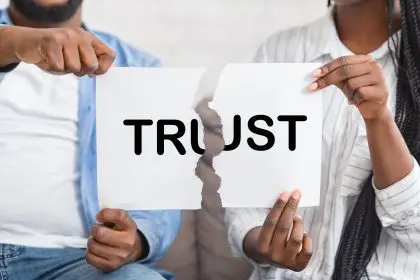Relationships are meant to bring joy, support, and love. However, not every relationship is healthy. Sometimes, the very connection that should lift you up can be the one dragging you down. Identifying a toxic relationship isn’t always easy, but it’s crucial for your emotional and mental well-being.
If you’ve ever felt consistently drained, anxious, or manipulated in a relationship, these may be signs that things are more damaging than healthy. Fortunately, recognizing the signs is the first step toward healing and making positive changes.
1. Constant criticism and belittling
Are you constantly criticized or made to feel inadequate? Constructive criticism is part of any relationship, but when it’s persistent, hurtful, and never balanced with praise, it becomes damaging. Toxic partners often belittle your efforts, appearance, or accomplishments.
Over time, this can lead to a significant drop in self-esteem and emotional exhaustion. Fixing this requires open communication. Express your feelings and set boundaries, explaining that belittling comments are not acceptable.
2. Emotional manipulation
Emotional manipulation is one of the clearest signs of a toxic relationship. This occurs when your partner uses guilt, fear, or obligation to control your actions or decisions. You may often find yourself doing things you’re uncomfortable with just to avoid conflict or to make them happy.
How to fix it: Recognize the manipulation and stand your ground. It’s important to assert your needs and not be swayed by guilt or emotional tactics. Healthy relationships involve mutual respect and understanding, not control through manipulation.
3. Lack of trust
Trust is the foundation of any healthy relationship. When your partner constantly accuses you of lying, cheating, or hiding things, even when you’ve done nothing to warrant it, you’re in a toxic relationship. Constant surveillance or interrogation can lead to feelings of frustration, anxiety, and resentment.
To rebuild trust, both partners must work on their insecurities and communicate openly about their fears. Trust can only grow in an environment where both feel safe and respected.
4. Feeling drained rather than energized
Do you feel emotionally exhausted after spending time with your partner? Healthy relationships should recharge you, not drain your energy. Toxic relationships are emotionally draining because they’re filled with constant conflict, insecurity, or dissatisfaction.
Recognizing when you’re feeling consistently worn out in a relationship is key. Fixing this requires both parties to acknowledge the problem. Taking time apart to focus on self-care and re-establish boundaries can often help bring some balance back to the relationship.
5. Lack of support
A healthy relationship is one where both partners support each other’s goals, dreams, and challenges. In a toxic relationship, however, there is little to no emotional or moral support. Instead, there may be jealousy, sabotage, or a general disinterest in your success or well-being.
To address this issue, have an honest conversation with your partner about your need for support. Explain how their indifference or lack of encouragement affects you. If they truly care, they’ll make efforts to be more supportive.
6. Isolation from friends and family
Is your partner trying to isolate you from friends and family? Toxic relationships often thrive on isolation. Your partner may discourage you from spending time with loved ones, subtly or overtly manipulating situations to make you feel that they’re the only one you can rely on.
To fix this, recognize your right to maintain relationships outside of your partnership. Talk to your partner about the importance of these connections and assert your need for personal space and time with friends and family.
7. Physical or emotional abuse
This is the most serious sign of a toxic relationship. Physical, emotional, or verbal abuse has no place in any relationship. Abuse can manifest in hitting, yelling, name-calling, or degrading comments, leaving you feeling trapped or scared. If you find yourself in this situation, it’s essential to seek help immediately.
Fixing an abusive relationship is not always possible without professional help. Counseling or therapy might be necessary to address the root causes of the abuse. In extreme cases, leaving the relationship might be the only safe option.
How to begin fixing a toxic relationship
Fixing a toxic relationship isn’t easy, but it’s not impossible either. The first step is acknowledgment. Both you and your partner need to be aware of the toxicity and committed to making changes. Here’s how to start:
1. Open communication
Toxicity often festers in the absence of clear communication. Sit down with your partner and express your feelings. Be honest about what hurts and what needs to change. Likewise, be open to hearing their concerns. You may find that they are unaware of their toxic behaviors, or there may be underlying issues both of you need to address.
2. Set boundaries
Boundaries are essential for a healthy relationship. Make sure your partner understands what behaviors are unacceptable. Whether it’s belittling, controlling, or disrespecting your personal space, boundaries help ensure mutual respect. Stick to these boundaries and enforce consequences if they’re crossed.
3. Seek professional help
Sometimes, external help is necessary to fix a relationship. Couples therapy or counseling can offer a safe space for both partners to work through their issues with the guidance of a professional. Therapy is particularly helpful when dealing with deep-seated issues like emotional manipulation, insecurity, or past trauma.
4. Focus on self-care
While working to fix your relationship, don’t neglect yourself. Engage in activities that make you happy, connect with friends and family, and take care of your mental and physical health. Remember, you cannot pour from an empty cup. Prioritizing your well-being is critical in healing from a toxic relationship.
5. Know when to walk away
Not all toxic relationships can be fixed. If your partner refuses to change or if the toxic behaviors escalate, it may be time to consider ending the relationship. Walking away can be a difficult decision, but your emotional, mental, and physical health should always come first.
The road to healing
Toxic relationships can leave you feeling drained, unsupported, and manipulated, but recognizing the signs is the first step toward change. By acknowledging the issues and taking action—whether through communication, boundary-setting, or seeking help—you can work toward healing the relationship. However, always remember, if the toxicity is too severe, you have the power and the right to walk away. Prioritizing your well-being is the key to breaking free and moving toward a healthier, happier future.
This story was created using AI technology.
















